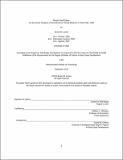Resort real estate : an economic analysis of second come pricing behavior in Park City, Utah
Author(s)
Larsen, Brady W
DownloadFull printable version (919.6Kb)
Alternative title
Economic analysis of second come pricing behavior in Park City, Utah
Other Contributors
Massachusetts Institute of Technology. Center for Real Estate. Program in Real Estate Development.
Advisor
William C. Wheaton.
Terms of use
Metadata
Show full item recordAbstract
The purpose of this research project is to examine the market pricing behavior of vacation homes in resort property markets. To accomplish this a price index is constructed to track real price fluctuations from 1981 to 2010 for the 3 localized ski resort markets in Park City, Utah. The resulting price indices reveal a history of cyclical price movements, and surprising long-term real price depreciation of 12% to 25% between 1981 and 2010. To determine the causes of the cyclical movements in the price indices, time series analysis is performed, and a model created to predict market behaviors based on past levels of price, construction, and skier days. The results of this exercise reveal that the number of annual skier days in the area is an effective representative of demand for housing, and that the local ski business has a considerable effect on real estate prices. Additionally, it is revealed that Park City's ski business is largely affected by national economic conditions, more so than by both regional economical conditions and local snowfall. The analysis concludes that despite the thirty year decline in real prices, the Park City resort market behaves as a well functioning, healthy market. The model indicates that while increases in prices do stimulate new construction, the growth in the total number of dwelling units reveals a relatively inelastic supply market. This suggests that any growth in demand should be accompanied with long-term price appreciation. Market forecasts based on various demand scenarios indicate that except in the most pessimistic cases, prices in Park City should experience healthy appreciation in the near to mid future. It is believed that these findings can be applicable to various resort markets.
Description
Thesis (S.M. in Real Estate Development)--Massachusetts Institute of Technology, Program in Real Estate Development in Conjunction with the Center for Real Estate , 2010. Cataloged from PDF version of thesis. Includes bibliographical references (p. 64).
Date issued
2010Department
Massachusetts Institute of Technology. Center for Real Estate. Program in Real Estate Development.; Massachusetts Institute of Technology. Center for Real EstatePublisher
Massachusetts Institute of Technology
Keywords
Center for Real Estate. Program in Real Estate Development.